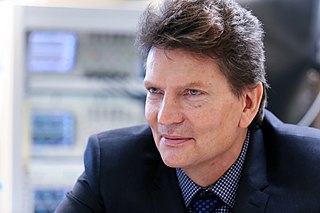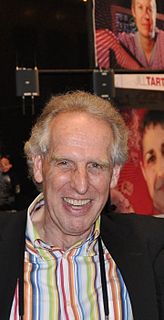A Quote by Henry Markram
You stimulate the neo-cortex, it produces a symphony. But it's not just a symphony of perception. It's a symphony of your universe. Your reality.
Related Quotes
It seemed to me that had Haydn lived to our day he would have retained his own style while accepting something of the new at the same time. That was the kind of symphony I wanted to write: a symphony in the classical style. And when I saw that my idea was beginning to work, I called it the Classical Symphony.
You know how it is in the symphony when you are listening to the symphony, the last notes die away, and there's often a beat of silence in the auditorium before the applause begins. It's a very full and pregnant silence. Now theology should bring us to live into that silence, into that pregnant pause.
I sometimes like to think of God as a great symphony and the various spiritual paths as instruments in an orchestra. The gift that you have is like music waiting to be played. You need only to find the instrument that will best bring it out. You alone can never play all the instruments, and your music might not find voice in all the instruments. All you can do is find the instrument that suits you best, play it as well as you can, and add your music to the great symphony of divine creation.
As the great Confucius said, "The one who would be in constant happiness must frequently change." Flow. But we keep looking back, don't we? We cling to things in the past and cling to things in the present...Do you want to enjoy a symphony? Don't hold on to a few bars of the music. Don't hold on to a couple of notes. Let them pass, let them flow. The whole enjoyment of a symphony lies in your readiness to allow the notes to pass.
Have you seen a symphony orchestra? There is a person at the back carrying a triangle. Now and again the conductor will point to him or her and that person will play "ting." That might seem so insignificant, but in the conception of the composer something irreplaceable would be lost to the total beauty of the symphony if that "ting" did not happen.
A young man, just beginning the study of musical composition, once went to Mozart and asked him the formula for developing the theme of a symphony. Mozart suggested that a symphony was rather an ambitious project for a beginner: perhaps the young man might better try his hand at something simpler first. "But you were writing symphonies when you were my age." the student protested. "Yes, but I didn't have to ask how."
For in the immediate world, everything is to be discerned, for him who can discern it, and central and simply, without either dissection into science, or digestion into art, but with the whole of consciousness, seeking to perceive it as it stands: so that the aspect of a street in sunlight can roar in the heart of itself as a symphony, perhaps as no symphony can: and all of consciousness is shifted from the imagined, the revisive, to the effort to perceive simply the cruel radiation of what is.




































